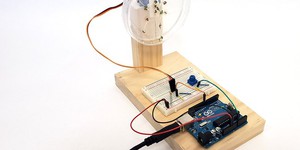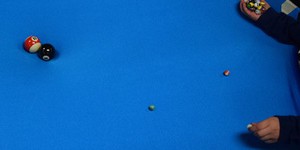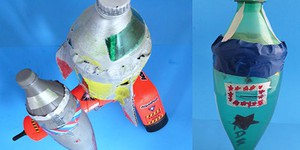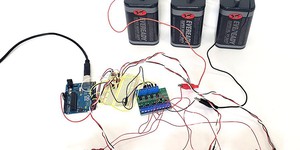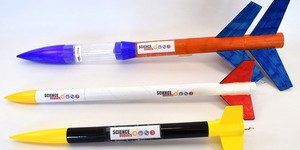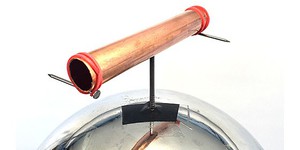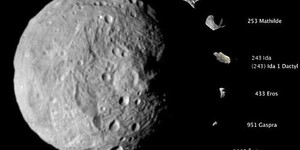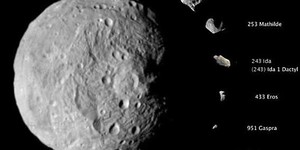High School, Space Exploration Science Projects (27 results)
Space exploration is an exciting and wide-ranging area. Getting into space (and back down) is hard, involving rockets and launch vehicles, satellites, spacecraft, re-entry systems, landers and rovers, robots, and orbital mechanics, not to mention hypothetical technologies like space elevators and artificial gravity. To survive and thrive in space, we must understand many additional issues such as human performance in space, the space economy, and the science of astronomical bodies.
|
Select a resource
Sort by
|
Can humans grow food in space? Can we grow plants on the Moon or on a space station? This is an important question to answer as humans look to expand our existence to the Moon, Mars, and beyond. In this science project you will build a clinostat, a device that can simulate microgravity right here on Earth and use it to explore the effects of microgravity on plant growth.
Read more
Featured
Have you heard that garlic powder is supposed to inhibit the growth of bacteria? Which do you think would make a better disinfectant: a solution of garlic powder or a solution of bleach? This project shows you a straightforward way to compare the effectiveness of different disinfectants (or other antimicrobial agents), by measuring zones of inhibition on a culture plate.
Read more
Why do the planets orbit the sun without flying off into space? Do they move in perfect circles or do their orbits take a different shape? And how could you possibly do a science project about any of this—you can't do an experiment with the planets! However, you can build a model of our solar system that demonstrates the concept of gravity, using balls of different sizes to represent the sun and planets. Watch this video for an excellent introduction to the model:
Think…
Read more
New
Engineers are trying to tackle the world's ocean pollution problem using robots. Some robots, like Mr. Trash Wheel and the ship featured in this Mark Rober video, are stationary and collect trash as it flows out of rivers before it gets into the ocean. Others, like the Jellyfishbot, are mobile and can squeeze into narrower spaces to collect trash:
Can you build and test your own trash-skimming robot? If you do not have access to a natural body of water to test it in, you can use a bathtub or a…
Read more
Rockets are definitively an engineering challenge. These amazing gravity-defying machines have lifted test material, people, and even animals into space. Feel like building one yourself? In this science project, you will transform a water bottle into an aerodynamic bottle rocket with two compartments, one for the fuel and one for a payload. You will then test how well it performs when lifting mass vertically up into the air. Ready, set, soar!
Read more
A mass driver uses electromagnetics to launch projectiles. In the future, such a device could launch payloads into space without the use of chemical rockets. This could lead to long-term cost savings when launching large amounts of material into space—for example, to construct a space station. In this project you will design and build your own working model mass driver as you learn some of the engineering principles behind how mass drivers operate.
Read more
What does it take to launch a robot to Mars or for a satellite to explore our outer solar system? In this project you will explore the physics of a rocket as you predict its performance, launch it, and measure the actual results. This is rocket science!
Read more
New
Drones are small, fast, and maneuverable - this can make them very hard to knock down! Check out this Mark Rober video where he explores both how professional defense companies and some backyard YouTube engineers tackle the problem of knocking drones out of the sky. Can you take this engineering challenge on yourself? What methods can you devise to take down a drone? Which one works the best?
Drones can be expensive, and you probably do not want to risk damaging a $1,000 drone for your science…
Read more
Build an ion wind rotor, a model of an ion thruster, using a Van de Graaff generator and experiment with different electrode designs.
Read more
You've heard of gold mining and coal mining, but think outside the box...or the planet...what about asteroid mining? Scientists, engineers, and business people believe asteroid mining is feasible, and they are in the beginning stages of long-term plans to mine asteroids for valuable resources during space missions. You don't want to miss out on all the fun; in this science project, you will come up with your own scientific plan for an asteroid mining company. We will help get you started by…
Read more
Space exploration, living, and working in space exposes space travelers and their equipment to radiation not present on Earth. The study of how we can protect ourselves and our equipment is an essential part of space exploration. Although you will not be able to test at levels equivalent to what you might encounter in space, you can test with lower and safer levels of radiation in the lab or at your home.
There are many types of radiation. This project concentrates on ionizing radiation, or…
Read more
Light sensors are part of many devices that we use every day. For example, they help your phone know when to automatically brighten or dim the screen based on ambient light levels. They can also be used to help solar panels track the sun, which helps the panels generate more power. Many spacecraft and planetary rovers are solar-powered. In this project you will build and program your own solar-tracking robot. Optionally, you can add solar panels and rechargeable batteries. Can your robot keep…
Read more
Did you know that in addition to the Sun and planets, our solar system is filled with millions of asteroids, which are chunks of rock left over from the early days of its formation, or from collisions between larger objects like planets? Agencies like NASA track asteroids, not only because they might pose a threat to humanity by colliding with Earth, but because they can provide us with information about the history of our solar system, and even be useful for mining raw materials in space! In…
Read more
|
Explore Our Science Videos
Why Won't it Mix? Discover the Brazil Nut Effect
Build a Bird Feeder to Study Birds – STEM activity
Cricket Wicket Knockdown: 2020 Engineering Challenge


